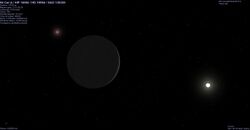Astronomy:94 Ceti b
From HandWiki
Short description: Extrasolar planet in the constellation Cetus
 Simulated view of the 94 Ceti binary system | |
| Discovery | |
|---|---|
| Discovered by | Mayor et al. |
| Discovery date | August 7, 2000 |
| Doppler Spectroscopy | |
| Orbital characteristics | |
| 1.427 AU (213,500,000 km)[1] | |
| Eccentricity | 0.30±0.04 |
| Orbital period | 535.7±3.1 d |
| Inclination | 65 or 115 ±3[1] |
| astron|astron|helion}} | 2,450,944±12 |
| 41±8 | |
| Semi-amplitude | 36.2±1.9 |
| Star | 94 Ceti |
| Physical characteristics | |
| Mass | 1.855±0.045[1] |♃|J}}}}}} |
94 Ceti b or 94 Ceti Ab to distinguish it from the distant red dwarf companion, is an extrasolar planet orbiting its star once every 1.2 years. It was discovered on August 7, 2000 by a team led by Michel Mayor.[2]
It is most stable if its inclination is about 65 or 115, yielding a mass of about 1.85 that of Jupiter.[1]
See also
References
- ↑ 1.0 1.1 1.2 1.3 Plávalová, Eva; Solovaya, Nina A. (2013). "Analysis of the motion of an extrasolar planet in a binary system". The Astronomical Journal 146 (5): 108. doi:10.1088/0004-6256/146/5/108. Bibcode: 2013AJ....146..108P.
- ↑ Mayor, M. (2004). "The CORALIE survey for southern extra-solar planets XII. Orbital solutions for 16 extra-solar planets discovered with CORALIE". Astronomy and Astrophysics 415 (1): 391–402. doi:10.1051/0004-6361:20034250. Bibcode: 2004A&A...415..391M. http://www.aanda.org/articles/aa/full/2004/07/aa0250/aa0250.html.
External links
Coordinates: ![]() 03h 12m 46.4365s, −01° 11′ 45.964″
03h 12m 46.4365s, −01° 11′ 45.964″
 |
